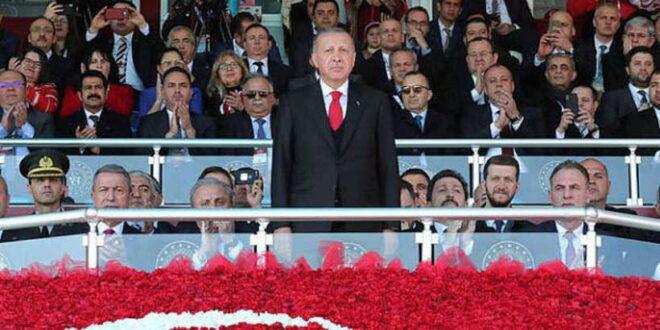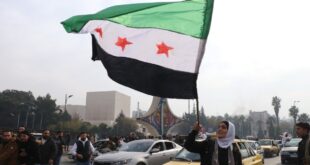It has finally been confirmed that the authority and its national ally in Turkey want to hold parliamentary and presidential elections before their supposed date of June 2023. President Erdogan has set the date of May 14 as “appropriate” for holding them, just as his ally, Devlet Bahceli, had previously thought that the month of May “would be appropriate.”
This date has an important symbolism that all those who dealt with it pointed out, which is that it is the date on which the general elections took place in 1950, and led to the Republican People’s Party losing the power that it had monopolized since the founding of the Turkish Republic, and the opposition Democratic Party rose to power. Many commentators saw in choosing this date as the date for the upcoming elections a major mistake in which the authority made, because its symbolic meaning requires the rise of the opposition to power.
Now officially setting this date requires the approval of a parliamentary majority of at least 360 deputies, which is the number that exceeds the sum of the deputies of the two allied parties, and it will take the approval of a section of the opposition deputies to complete this minimum. In the event that it is not possible to approve the new date for the elections in Parliament, the President of the Republic has the authority to approve it by a presidential decision, but in this case he is not entitled to run for elections for the third time as stipulated in the effective constitution. The third and last possibility is that the Supreme Elections Commission strives to interpret the relevant article in the constitution and considers Erdogan the right to run for the presidential elections.
But why engage in all these complications in the first place, instead of adhering to the scheduled date in advance, and what is the benefit of anticipating this date by only forty days?
The first reason is not to leave Erdogan’s right to run for a new term subject to controversy because the constitution limits this right to two terms only, and to obtain constitutional legitimacy without any impurities, so that he will not face any questioning of this legitimacy if he wins the presidential elections as he hopes.
Economists attribute the second reason to a more important factor, from their point of view, which is that the economic crisis is likely to exacerbate further after the elections, after the government managed to artificially stop the decline relatively in the past few months, and after it launched a series of social initiatives to mitigate the effects of runaway inflation. Such as increasing the minimum wage, exemption from late tax dues, announcing a huge housing project for low-income people, and controlling the exchange rate of the lira at certain limits for months. As for anticipating the date for a very short period, they estimate that it is due to the fact that these measures will not last until June, basing their pessimistic expectations on the precedent of the June 2018 elections, which was immediately followed by a sharp deterioration in the exchange rate of the lira against hard currencies.
What about the opposition and its opinion on the new date for the elections?
When the authority started talking about the possibility of bringing the date closer, the leaders of the six-party opposition announced that they would not accept any new date unless it was before the sixth of April. The reason for this is that the new election law enacted by the authority and approved by Parliament will not enter into force until after this date, bearing in mind that the opposition was against changing the electoral law because, in its opinion, it gives the authority a preference and deprives the opposition coalition of the right to participate in the parliamentary elections with unified lists.
The strange thing is that the proposal to date the elections in the month of May, that is, after the sixth of April, did not raise any serious objection from the six-party opposition. Rather, it seems that they are in the process of approving the proposal. The only explanation for this situation is that the six-party opposition feels that its victory in the elections has become “in the pocket”! Knowing that opinion polls began to indicate a relative improvement in the popularity of the ruling coalition, compared to previous periods.
In addition to the above-mentioned social initiatives, other factors in foreign policy this time played a role in improving the popularity of the government, perhaps the most prominent of which is the major shift in Turkish policy in the Syrian conflict, i.e. launching the path of normalization with Bashar’s regime. This new policy snatched two important cards from the opposition, namely this normalization itself, and the issue of the return of Syrian refugees to their countries, which is linked to it. On the other hand, there is no serious objection by the opposition to the continuation of the policy against the supposed Kurdish entity in northern Syria. If this matter is linked to normalization with Bashar’s regime and it is possible to establish cooperation with it against the Syrian Democratic Forces, then this is also what the most prominent six-party opposition parties want: the Republican People and the Good Party, in addition to the Victory Party against Syrian refugees from outside the six-party alliance.
There are external developments independent of both the regime and the opposition that are likely to play a role in the results of the upcoming elections, especially the presidential one, which will determine Erdogan’s political fate. During the past week, two incidents took place in Sweden that sparked sharp reactions in Turkey. The first was when Kurdish demonstrators from Turkey raised insulting pictures of Erdogan in front of the Turkish consulate, and the second was when an extreme right-wing person burned a copy of the Holy Qur’an in front of the Turkish consulate in Stockholm under the watch of the police and with prior judicial permission. . This led to Turkey canceling a visit that the Swedish Defense Minister intended to make to Ankara, as part of the Swedish attempts to persuade Turkey to drop its objection to its accession to NATO.
The first consequence of the two aforementioned incidents was to shelve Sweden’s membership in the Atlantic for an indefinite period. As for their potential impact on the results of the upcoming elections, it may be positive from the perspective of the Turkish authority, because it led to mobilization of national and religious feelings, and even the opposition parties’ reactions matched the reaction of the authority towards the two incidents. It is possible to add the focused campaign launched recently against the Turkish leadership in Western media, including the British magazine The Economist, which devoted the cover of its latest issue to warning of Erdogan’s possible victory in the upcoming elections, describing it as a “turn towards dictatorship”, including articles and statements by American politicians following the same trend.
This campaign and the two events in Sweden are not unlikely to lead to opposite results for those who initiated it and fabricated it, which increases the popular rally around the Turkish leadership and makes the voter forget the pressing economic difficulties that would have pushed him away from voting for the ruling coalition.
 Geostrategic Media Political Commentary, Analysis, Security, Defense
Geostrategic Media Political Commentary, Analysis, Security, Defense





